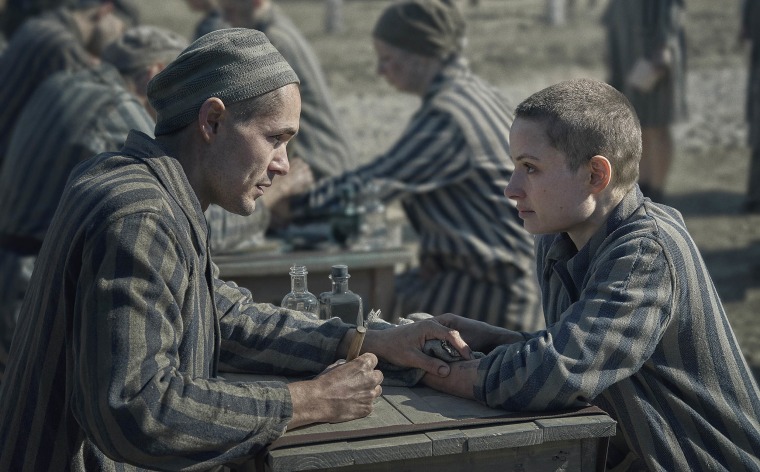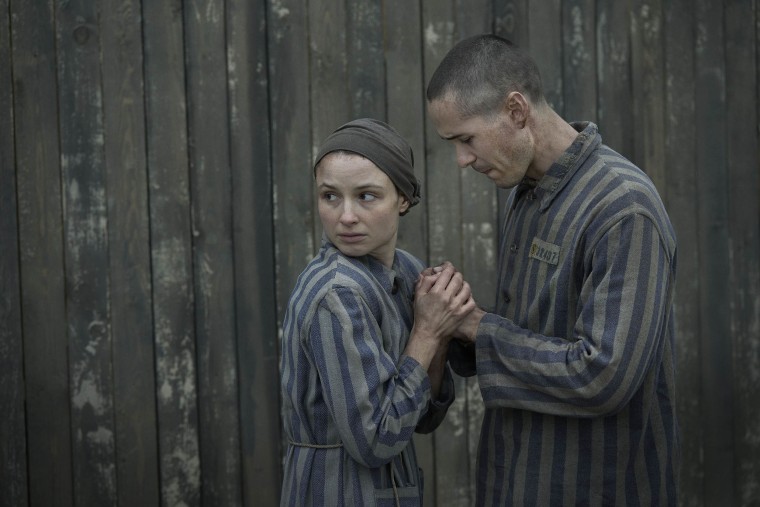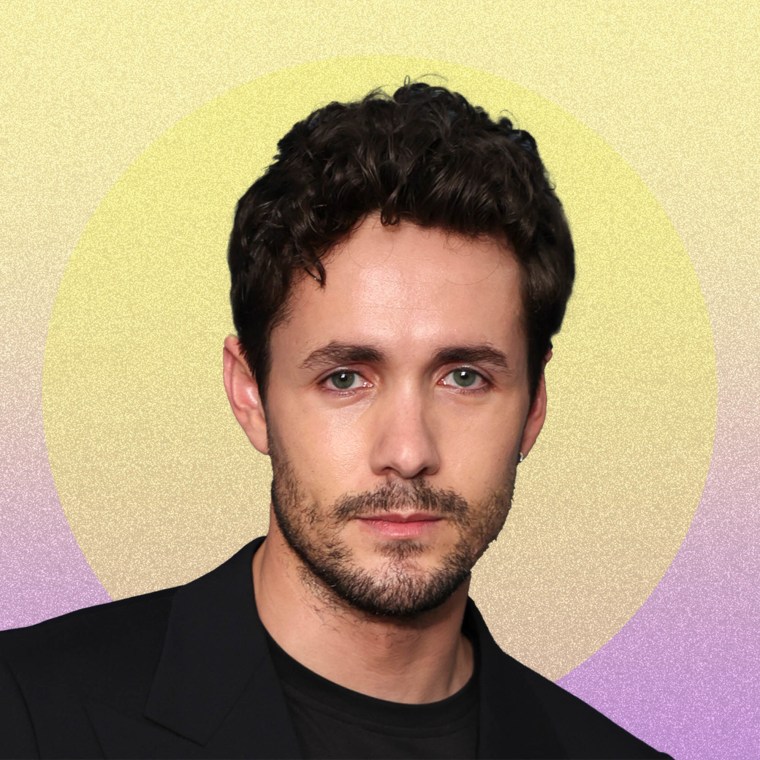Jonah Hauer-King, who plays Lale Sokolov in the television adaptation of the popular novel “The Tattooist of Auschwitz,” is opening up about the reality of portraying a Holocaust survivor.
The six-episode Peacock series follows Lale, a Slovakian Jew, who winds up as a tattooist while being held prisoner at Auschwitz concentration camp during World War II. Lale, who also goes by Lali, is marking the arms of fellow prisoners coming into the camp when he meets Gita Furman, who quickly captures his heart.
The new show tells Lali and Gita's love story, while maintaining themes of resilience, compassion, trauma and hope.
TODAY.com caught up with Hauer-King to discuss what playing this role means to him, how the show practices sensitivity when depicting the Holocaust and how the series compares to the book.
This interview has been edited and condensed for clarity.
'The Tattooist of Auschwitz' book was originally published in 2018. How long has the idea for a television adaptation been in the works?
These things, they just really take time. Claire (Mundell), who’s with us here in New York, is the executive producer and runs a production company. They optioned the book back in 2018, when it came out, and then it was a process of finding networks and channels and seeing who was going to take it on.
A story like this, especially the scale of it, and all the research (and) preparation that has to go into it, it can’t be rushed, obviously. So, it’s been about a six-year journey for them. It’s been about a two-year journey for me.
When did you find out that you got the role in the TV adaptation?
I’d read the book, then they phoned me about just over two years ago and said, 'They’re talking about making it into a TV show and they’d like to meet you.' And it definitely made me feel a certain kind of way, a way that doesn’t feel very normal. It was a unique feeling of excitement and nerves, even though I hadn’t even been offered it yet. Just the very thought of doing it felt quite daunting, but also to have the chance to tell a story like doesn’t come along very often.
So, I went along to the meeting, and met with Claire and — we were talking about this last night at dinner, kind of reminiscing — we had a lovely, long lunch and had hours of speaking about why we love the book so much and what it meant to us. I was really pitching to her about why I wanted to do it and what I felt like I could bring. And then it turned out she was kind of pitching to me, as well, and it never happens like that. It’s always me auditioning and trying to make it happen. So, it was very nice to seem like they were being quite forthcoming.
After reading the book, did you see yourself playing the role of Lali?
Yeah, I think any time you’re telling a story about someone who has lived, it’s quite daunting. It feels like you want to be respectful of that life. And particularly now, and in this context, it felt so important that the story was done justice.

At times it felt quite overwhelming because you just wanted so much to tell this story right, and Lali's son is still alive. I wanted to feel like he thought it was done respectfully. But I also felt excited by and energized by it because I knew that it was a story that should be told and needed to be told and needed to be remembered.
So that was quite galvanizing, I guess. So anytime I felt really daunted and terrified, I just tried to channel that into my preparation and my research and my work.
How did you prepare to play Lali?
It was a long process. I was very lucky to have quite a few months of time before I started filming. So, that was quite a long journey, I guess, of research, which started with going to Auschwitz. I just got on a plane and went to Krakow (Poland). I’d been as a young boy on a history trip, but I really wanted to go again to pay my respects and also to really start seeing the camp through Lali's eyes.
So much of the book is sort of through his lens and it’s about his day-to-day life and his routine and the geography of the camp. And I really wanted to go back, having read the book and knowing his story specifically, and see it through his eyes. So I did that.
Then, the next stage was partnering with this amazing historical and cultural advisor whose father was a survivor, and she gave us these amazing resources in quite a zoomed-out way, not about Lali specifically. Initially, it was survivors' accounts, documentaries, all kinds of responses and literature about it.
And then specific research on Lali and Gita started, and that involved looking at all of their testimonies that they’d given over the years in the '90s, but then also (Lali's testimony) to Heather Morris when he decided to tell his story to her. And that was so helpful, getting a sense of who he was through these videos. I watched them for hours and hours on end. It was very, very illuminating, but also strangely addictive to feel like you know so much about someone, and then to have them on screen in front of you talking about their experiences was very moving.
How does the show relate to the book, and how much is a true story?
So in terms of relating to the book, it definitely in essence is the same, it’s Lali's story. And it wanted to capture his account and to capture his experiences of being there that he had told Heather. I suppose that (there are) a couple of changes. It's always going to be slightly different when you tell a story through a different medium. And I think in a way that felt really positive.
Heather Morris did so much research when she released the book, but when you do a television show, you can build on that. You can go even further. You can talk to even more people. You can show things through TV that you’re not able to show through a book necessarily. So, we wanted to capture the essence of it.
Then, I suppose, the main change ... is that we wanted to draw out the telling of how Lali actually revealed his account to have in the book. It’s an epilogue (in the book), a kind of three-page bit right at the end. But we felt that that was such an important part of this because I think it shone a light on his experiences in the camp, but also how it’s affected him over many decades and the trauma that he’s carried, and how much that’s impacted his life.
So we wanted to draw that out and look at that and (his) memory and look at how he was retelling those stories. And so we thought that that was an interesting way in.
How did the team practice sensitivity when depicting events of the Holocaust, and how do you think that will impact viewers?
Yeah, I mean dealing with the sensitivity, and telling the story respectfully was, I would say, our No. 1 goal. Because whilst we believe in our hearts that this is an important story to tell, this is living history. It happened very recently. There are many people who have been directly and indirectly affected by this time.
So, for us, there were a few ways. The big part of it was preparation and research, making sure that we were creating an authentic and meticulously detailed version of the story that felt historically accurate. It was also working with a historical and cultural advisor, and she had a massive part to play in making sure it was being told sensitively.

But the most meaningful part of this whole experience were two things: One was spending time (with) and meeting Gary Sokolov, Lali and Gita's son, and knowing that we had his blessing and that he was happy with the story and was moved by the story. And he spent the whole week with us in London last week doing press, and that was a really full circle moment for us because, ultimately, he’s the closest connection to this. So, to have his generosity was incredible. But you’re right to ask because there are always points where you’re telling a story like this, that it’s such a dark past, I think you do waver sometimes. But I think we kept to the mantra that it’s important to remember this and that we need to tell these stories.
And I think the other thing that I mentioned that really, again, was probably the most meaningful part of this was going to a Holocaust survivor center in London, and speaking to them and hearing their stories and, again, having that blessing. It felt extremely moving because what they were saying to us was, "We need the story out there. We want it to be told, we want it to be remembered. So thank you for doing it." And obviously that was our purpose, but to hear it from the people who actually were impacted by this and affected by it, I think we felt extremely grateful for that generosity.
Did playing the role of Lali change you in any way?
Wow, it was definitely my most formative job, because it was so much more than a job. It went so much more beyond that. And I was changed by what I learned of the history, even though I knew quite a lot about it going into it.
But I think the thing, probably my greatest takeaway, was my understanding and experience of Lali himself and who he was and his spirit, because I felt like he’s such an extraordinary man. And he was so compassionate and (had) so much humanity and was so committed to others, and was being put in these impossible situations, being given impossible choices. And whilst there was never a right answer or a right decision to make, he was always driven by his wish to try and help others. And that’s such a meaningful lesson and something that I’m just really inspired by going forward.

